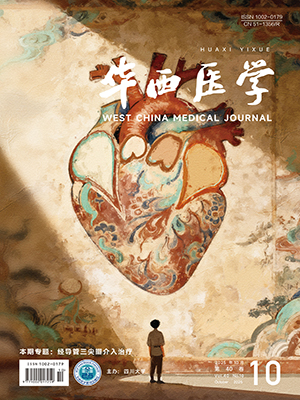| 1. |
Goldacre MJ, Roberts SE. Hospital admission for acute pancreatitis in an English population, 1963-98:database study of incidence and mortality[J]. BMJ, 2004, 328(7454):1466-1469.
|
| 2. |
Defrances CJ, Lucas CA, Buie VC, et al. National hospital discharge survey[J]. Natl Health Stat Report, 2008, 5(6):1-20.
|
| 3. |
Cavallini G, Frulloni L, Bassi C, et al. Prospective multicentre survey on acute pancreatitis in Italy (ProInf-AISP):results on 1005 patients[J]. Dig Liver Dis, 2004, 36(3):205-211.
|
| 4. |
Peery AF, Dellon ES, Lund J, et al. Burden of gastrointestinal disease in the United States:2012 update[J]. Gastroenterology, 2012, 143(5):1179-1187.
|
| 5. |
Villatoro E, Mulla M, Larvin M. Antibiotic therapy for prophylaxis against infection of pancreatic necrosis in acute pancreatitis[J]. Cochrane Database Syst Rev, 2010(5):CD002941.
|
| 6. |
Wang Q, Guo Z, Zhao P. Chinese herbal medicines for acute pancreatitis[J]. Cochrane Database Syst Rev, 2005(1):CD003631.
|
| 7. |
Al-Omran M, Albalawi ZH, Tashkandi MF, et al. Enteral versus parenteral nutrition for acute pancreatitis[J]. Cochrane Database Syst Rev, 2010(1):CD002837.
|
| 8. |
Déchelotte P, Hasselmann M, Cynober L, et al. L-alanyl-L-glutamine dipeptide-supplemented total parenteral nutrition reduces infectious complications and glucose intolerance in critically ill patients:the French controlled, randomized, double-blind, multicenter study[J]. Crit Care Med, 2006, 34(3):598-604.
|
| 9. |
Zou XP, Chen M, Wei W, et al. Effects of enteral immunonutrition on the maintenance of gut barrier function and immune function in pigs with severe acute pancreatitis[J]. JPEN J Parenter Enteral Nutr, 2010, 34(5):554-566.
|
| 10. |
Ockenga J, Borchert K, Rifai K, et al. Effect of glutamine-enriched total parenteral nutrition in patients with acute pancreatitis[J]. Clin Nutr, 2002, 21(5):409-416.
|
| 11. |
Sahin H, Mercanligil SM, Inanç N, et al. Effects of glutamine-enriched total parenteral nutrition on acute pancreatitis[J]. Eur J Clin Nutr, 2007, 61(12):1429-1434.
|
| 12. |
韩梅, 刘彤, 刘刚, 等. 免疫营养剂对重症胰腺炎患者疗效观察[J]. 天津医科大学学报, 2011, 17(2):227-229.
|
| 13. |
He XL, Qj M, Lu JG, et al. Effect of total parenteral nutrition (TPN) with and without glutamine dipeptide supplementation on outcome in severe acute pancreatitis (SAP)[J]. Clin Nutr Suppl, 2004, 1(1):43-47.
|
| 14. |
Fuentes-Orozco C, Cervantes-Guevara G, Muciño-Hernández I, et al. L-alanyl-L-glutamine-supplemented parenteral nutrition decreases infectious morbidity rate in patients with severe acute pancreatitis[J]. JPEN J Parenter Enteral Nutr, 2008, 32(4):403-411.
|
| 15. |
Hajdú N, Belágyi T, Issekutz A, et al. Intravenous glutamine and early nasojejunal nutrition in severe acute pancreatitis-a prospective randomized clinical study[J]. Magy Seb, 2012, 65(2):44-51.
|
| 16. |
Alderson P, Green S, Higgins J. Cochrane Reviewers'Handbook 4.2.3[Updated November 2004] [M/OL]. The Cochrane collaboration,[2011-10-18]. www.stirrhs.ca/files/handbook.pdf.
|
| 17. |
Beger HG, Rau B, Mayer J, et al. Natural course of acute pancreatitis[J]. World J Surg, 1997, 21(2):130-135.
|
| 18. |
Tenner S, Sica G, Hughes M, et al. Relationship of necrosis to organ failure in severe acute pancreatitis[J]. Gastroenterology, 1997, 113(3):899-903.
|
| 19. |
Norman J. The role of cytokines in the pathogenesis of acute pancreatitis[J]. Am J Surg, 1998, 175(1):76-83.
|
| 20. |
Schmid SW, Uhl W, Friess H, et al. The role of infection in acute pancreatitis[J]. Gut, 1999, 45(2):311.
|
| 21. |
Lankisch PG, Weber-Dany B, Doobe C, et al. Plasma glutamine levels are negatively correlated with the severity of acute pancreatitis[J]. Pancreas, 2008, 36(3):322-324.
|




